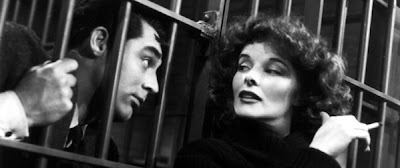Bringing Up Baby (1938)
d. Howard Hawks / USA / 102 mins.
Bringing Up Baby is a quick film – not in length, mind you (it's only 102 minutes), but in content. If you slowed down the dialogue, pulled back on the slapstick, and minimized the screaming and jumping and running and fainting and falling and chasing, you might easily be able to fill nearly three hours as a "normal" comedy. But you'll never remember Bringing Up Baby for anything other than its splendidly organized chaos. Well, maybe you'll remember it for how hard you laugh. And maybe for that showtune-loving leopard.
But like so many brilliant works, it bombed. RKO – the film's studio – didn't find its screwball humor that funny and came to distrust the film's director, Howard Hawks, who did find it funny; Hawks soon found himself bumped out of RKO. Katharine Hepburn, known today for her record-setting four Academy Awards, was bumped from her next RKO production, too, and acquired the moniker of "box office poison." (She somehow managed to bounce back, you might say.) Cary Grant was already a star by the making of Bringing Up Baby so his reputation emerged untarnished, but the film performed poorly at the box office.
Although Bringing Up Baby was not the first screwball comedy (and by my scale, not the absolute best either), it is undoubtedly the most famous. There's a lot of logic in that categorization, too. More than any other screwball comedy, the plot of Bringing Up Baby best resembles a stick of taffy, contorted and layered inward before being stretched so far it nearly rips apart in the middle. Summarizing the plot doesn't do its comedic unfolding justice, but let me throw out a few words: stuffy paleontologist, quirky heiress, Victrola-sniffing leopard, runaway dog, missing dinosaur bone, oblivious aunt, confused police constable, timid groom, stern bride, alluring interloper.
For those who have seen Bringing Up Baby, perhaps there's some sense in those words. For those who haven't, I'll avoid going too deep: Grant is David Huxley, a nerdy and low-key paleontologist who is set for his wedding when he receives word that not only will the missing bone of his brontosaurus arrive but he must charm a wealthy woman who is leaning toward donating a million dollars to the museum. Enter Susan Vance (Hepburn), a wealthy and care-free socialite who blows into David's life and within moments proves to be a fast-talking, wise-making complication.
In reviews of Bringing Up Baby, Susan is frequently described as ditzy. Wrong word, I think. Hepburn plays her as a cunning and crafty woman who simply doesn't care about the extent of her high jinks, as long as David is distracted from what he should be doing and focused on her. Consider the introduction of the Baby from the film's title, a tame and gentle leopard with a penchant for phonographs and dogs. Baby is a gift from Susan's brother (a hilarious gift for the screwball antics, certainly), and while David has no earthly reason to help Susan handle the big cat, he does anyway, thanks to her guile – and undoubtedly her sex appeal. Bringing Up Baby is one of the randiest of all Golden Age comedies, and we know very early on that Susan openly likes David, and David likes Susan although he doesn't know it yet. The constant references to sex lie merely millimeters below the film's surface, and at times are veiled so thinly you'd swear it was blatantly transparent. (On the hunt for a bone, anyone?)
You can't say enough for the on-screen chemistry of Grant and Hepburn. They were two vibrant leading performers, almost destined to play off each other's strengths and weaknesses to comic perfection. He is as fluid as ever, but in the best of ways: light enough to make it seem casual but obviously working overtime to make sure the performance is delivered correctly. Believe it or not, Bringing Up Baby was Hepburn's first all-out comedy; word is she overplayed her hand initially but with the help of some vaudeville coaches, she quickly turned into an excellent comic actress. (And of course after Bringing Up Baby, she would go on to star in one of her most famous films, The Philadelphia Story.) Playing loquacious can be a grueling and challenging task, but every line from Hepburn's mouth, from the lilting to the frantic, brims with centralized energy.
If Bringing Up Baby has any weakness, it's but a single and nearly forgivable one: it plows ahead at the speed of a downhill locomotive and when it slows even momentarily – as it does when Susan and David are having dinner with her aunt and a visiting major – the difference in pacing and tone becomes so evident that the laugh-out-loud humor drains from the celluloid. The breakneck antics return for the ending, and when the film fully reclaims its heightened madcap rush, it charmingly crashes to a halt.
Was there a more versatile director in Hollywood than Howard Hawks? You could perhaps make an argument for the Warners workhorse Michael Curtiz, but Hawks's work spanned multiple genres, often blazingly. He did the crime film (1932's Scarface), the screwball comedy (this and His Girl Friday), the detective story (The Big Sleep), the historical drama (Sergeant York), the western (Red River, Rio Bravo), the cautionary episode of science fiction (The Thing From Another World), and even the musical (Gentlemen Prefer Blondes). His two screwballs are some of the funniest films I've seen, not only from the 1930s and 1940s but from any decade. Although His Girl Friday might be a slightly superior film overall, there's no denying Bringing Up Baby is among the finest comedies ever produced in Hollywood. If you haven't seen it, do so now – you'll realize they don't make madcap like they used to.






0 comments:
Post a Comment